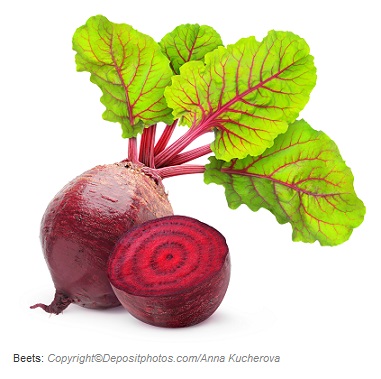Being famous also as beetroot, garden beet, and golden beet, beets are eaten either  cooked or raw. The leafy parts are known as beet greens, which are also edible. One cup of beets contains 13 grams of carbohydrates, 3 grams of fiber and 2 grams of protein.
cooked or raw. The leafy parts are known as beet greens, which are also edible. One cup of beets contains 13 grams of carbohydrates, 3 grams of fiber and 2 grams of protein.
Average calories: 60 per one cup.
|
Beets: one cup |
|
|
Carbohydrate |
13 |
|
Fiber |
3 |
|
Protein |
2 |
|
Fat |
0 |
|
Calories |
60 |
Vitamins found in higher amounts: vitamins B9, C, B6, B2 and B1.
Minerals found in higher amounts: manganese, potassium, magnesium, and iron.
Phytonutrients found in higher amounts and their health benefits: the phytochemicals in beets are phytosterols, betaine, betalains, and carotenoids.
Phytosterols are plant steroids and exhibit beneficial impacts on cardiovascular disease. One cup of beets contains approximately 45 mg of phytosteols.
Betaine is a chemical compound found in beets, 175 mg in one cup of beets. Functioning along with vitamins B12, B9 and B6, betaine lowers homocysteine level. Homocysteine increases the risk of cardiovascular diseases. Betaine may have a protective effect against deposition of fats in the liver (fatty liver). For detailed information about fatty liver, see “Fatty Liver Disease” under the section of “Medicinal Nutrition“.
A unique phytonutrient in beets is betalains (betanin and vulgaxanthin). They have antioxidant, anti-inflammatory, and detoxifying effects. The red color of the vegetable results from betanin. It is a water-soluble and heat sensitive pigment that could be destroyed in a prolonged cooking. However, betanin cannot be metabolized in the body, leading to appearance in urine (beeturia) and stool and giving a reddish color to them.
Rhubarb, chard, cactus prickly pear and amaranth are other food sources of betalains. Betanin is also used as a food coloring agent to color meats, sausages, and ice cream.
Lutein and zeaxanthin are the two carotenoid phytonutrients found in beet greens more than beetroot. One cup of raw beet greens provides about 275 mcg of lutein.
Other phytonutrients in beets include caffeic acid, ferulic acid, kampferol and quercetin.
Beet and beetroot juice may enhance athletic performance by providing nitrites. Nitrite is a key component of nitric oxide (NO). It is a potent vasodilator, improving blood circulation. NO is made from the amino acid L-arginine in the body. There are many athletic food supplements in the market to be claimed to provide precursors for production of NO.
In summary, beets and its juices may be beneficial in athletic performance and erectile sexual dysfunction by improving the production of NO.

